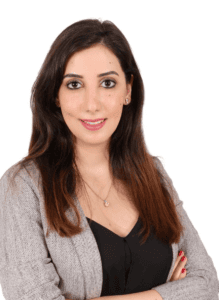From lab bench to Backbench
Dr Martine Abboud, Kellogg Junior Research Fellow and member of the Schofield Group at the Department of Chemistry, has been selected as a Royal Society Pairing Fellow.
Each year 30 research scientists are paired with UK parliamentarians and civil servants. They learn about each other’s work by spending time together in Westminster and the researcher’s institutions.

Dr Abboud will be swapping a lab coat for legislation when she visits the Houses of Parliament and Whitehall for a week in Westminster, as part of a unique pairing scheme run by the Royal Society with support from the Government Office of Science. The Royal Society’s pairing scheme aims to build bridges between parliamentarians, civil servants and some of the best scientists in the UK.
During her visit, Dr Abboud will shadow Anneliese Dodds MP (Oxford East) and learn about her work. As well as attending seminars, panel discussions and a mock Select Committee about how evidence is used in policy making. The visit will provide Dr Abboud with a behind the scenes insight into how policy is formed and how her research can be used to make evidence-based decisions. It will also give Dodds MP the opportunity to investigate the science behind her decisions and improve their access to scientific evidence.
Dodds MP will get hands on experience of scientific research when she dons a lab coat to visit Dr Abboud at Oxford Chemistry and Kellogg College later this year.
Sir Venki Ramakrishnan, President of the Royal Society, said, “It is crucial that we invest in the relationship between scientists and politicians, so that either profession can articulate and appreciate the pressures confronted by both. The Royal Society Pairing Scheme does just this, endowing scientists with a fascinating insight into parliament, and connecting policymakers with the best innovative thinking in the world, and in the process, enabling both to draw from and engage with the mutual expertise needed to address the challenges of our time.”